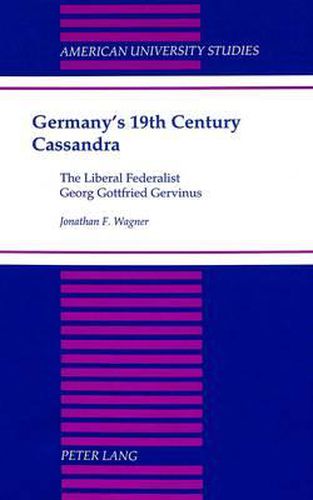Readings Newsletter
Become a Readings Member to make your shopping experience even easier.
Sign in or sign up for free!
You’re not far away from qualifying for FREE standard shipping within Australia
You’ve qualified for FREE standard shipping within Australia
The cart is loading…






The political-intellectual life of the literary historian and liberal, G.G. Gervinus (1805-1871) extended from Metternich’s restorations to Bismarck’s unification. From youth, Gervinus played a leading role in the movement for liberal reform and German unity. After the 1848 Revolution, however, he became an outspoken democrat advocating a German republic. This turn to the left caused him to oppose Bismarck’s unification. Despite the scorn of nationalists and liberals, Gervinus denounced the new German Empire for its violation of Germany’s historic federalism, its too-heavy reliance on militarism and its anti-democratic institutions. With uncanny prescience, Gervinus predicted war, enmity, and disaster for Germany. Ironically, recent German unification has come about in the shape Gervinus demanded in 1870-71; namely, in a republican, liberal and federalist form.
$9.00 standard shipping within Australia
FREE standard shipping within Australia for orders over $100.00
Express & International shipping calculated at checkout
The political-intellectual life of the literary historian and liberal, G.G. Gervinus (1805-1871) extended from Metternich’s restorations to Bismarck’s unification. From youth, Gervinus played a leading role in the movement for liberal reform and German unity. After the 1848 Revolution, however, he became an outspoken democrat advocating a German republic. This turn to the left caused him to oppose Bismarck’s unification. Despite the scorn of nationalists and liberals, Gervinus denounced the new German Empire for its violation of Germany’s historic federalism, its too-heavy reliance on militarism and its anti-democratic institutions. With uncanny prescience, Gervinus predicted war, enmity, and disaster for Germany. Ironically, recent German unification has come about in the shape Gervinus demanded in 1870-71; namely, in a republican, liberal and federalist form.